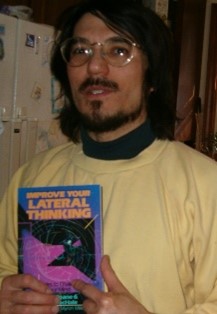Remembering Jeffrey Horn (1963-2024)

It is with considerable sadness that we inform the genetic and evolutionary computation (GEC) community that Jeffrey Horn, (61) passed away on February 5, 2024 at Negaunee, Michigan. Jeff received his undergraduate degree in Computer Science from Cornell University in 1985 and his Masters and Doctoral degrees from the University of Illinois at Urbana-Champaign in Computer Science in 1997. At Illinois, he was an early member of the Illinois Genetic Algorithms Laboratory (IlliGAL). At the direction of Prof. David E. Goldberg, IlliGAL’s researchers addressed fundamental and pragmatic issues related to the working of GEC algorithms, which helped shape many leading GEC researchers of repute today. After completing his PhD, Jeff joined the Department of Mathematics and Computer Science at Northern Michigan University in 1996. Students of NMU remember him as a caring teacher and friend.
He is remembered for his research in genetic algorithms specifically and evolutionary computation at large, focusing in evolutionary multi-objective optimization (EMO), understanding problem difficulty, and the evolution of cooperative co-solutions. His 1994 proposal of an EMO algorithm -- Niched Pareto genetic algorithm (NPGA) -- received more than 4,000 Google Scholar citations and is one of the three pioneering EMO algorithms which propelled the EMO field forward. His subsequent applications of NPGA to ground water remediation system design was one of the early practical applications of EMO algorithms. Besides his passion for EMO algorithm development and applications, he was deeply interested in understanding how to form stable niches within evolving populations to find multiple optimal solutions simultaneously. For this purpose, he introduced multi-modal deceptive and long path problems, which enabled researchers to have a better insight on the role of populations in evolutionary search algorithms. At NMU, he continued his quest for foundational aspects of GEC algorithms and extended his research to evolutionary robotics, artificial life, and applications in shape nesting problems and games.
He is survived by his wife, Gabriele Burkhard, and his children Thorin and Ellissa.
On March 4, 2024, Goldberg and Deb organized a remembrance event on zoom, which was attended by many of his lab-mates from Illinois, GEC researchers from across the globe, his recent students and colleagues from NMU, and his family members. His departure was sudden and unexpected. He will be deeply missed, but the moments he shared with us and the contributions he made for the GEC community, will always guide us, inspire us, and stay vivid within us.
Kalyanmoy Deb and David E. Goldberg